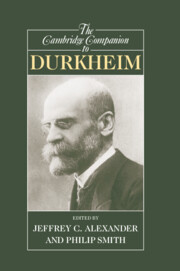Book contents
- Frontmatter
- 1 Introduction: the new Durkheim
- Part I: Life, context, and ideas
- 2 Durkheim’s life and context: something new about Durkheim?
- 3 Durkheim’s squares: types of social pathology and types of suicide
- 4 Practices and presuppositions: some questions about Durkheim and Les Formes élémentaires de la vie religieuse
- 5 The Durkheimian movement in France and in world sociology
- 6 The inner development of Durkheim’s sociological theory: from early writings to maturity
- 7 What difference does translation make: Les Formes élémentaires de la vie religieuse in French and English
- Part II: Symbols, rituals, and bodies
- Part III: Solidarity, difference, and morality
- Further reading
- Index
6 - The inner development of Durkheim’s sociological theory: from early writings to maturity
from Part I: - Life, context, and ideas
Published online by Cambridge University Press: 28 April 2008
- Frontmatter
- 1 Introduction: the new Durkheim
- Part I: Life, context, and ideas
- 2 Durkheim’s life and context: something new about Durkheim?
- 3 Durkheim’s squares: types of social pathology and types of suicide
- 4 Practices and presuppositions: some questions about Durkheim and Les Formes élémentaires de la vie religieuse
- 5 The Durkheimian movement in France and in world sociology
- 6 The inner development of Durkheim’s sociological theory: from early writings to maturity
- 7 What difference does translation make: Les Formes élémentaires de la vie religieuse in French and English
- Part II: Symbols, rituals, and bodies
- Part III: Solidarity, difference, and morality
- Further reading
- Index
Summary
On one thing most of Durkheim's readers, past and present, have always agreed: he, like Marx, emphasizes social structure. Durkheim helped to create classical sociology because he located social forces “outside” the individual actor. But from this point on, theoretical agreement ends. The problem for Durkheim and his interpreters, just as for Marx and his interlocutors, is what does structure mean? How does structure hold individuals within its limits? Of what are these limits composed? If structure exists, somehow, outside of the individual, can it act only in opposition to freedom?
The problematics of Durkheim interpretation, then, are precisely the ones around which Marxist inquiry has always revolved. The fundamental question has been how Durkheim stipulates the relation between structured and free action. People keep reading Durkheim, and arguing about him, to find out whether the determinateness of social structures must involve the sacrifice of autonomy and, conversely, whether insisting on human agency entails denying external control. How generations have understood Durkheim - and answered these theoretical questions through such interpretive understanding - has fundamentally shaped the pattern of sociological discourse. Debates over the meaning and path of Durkheim's work are, inevitably, arguments about the most basic directions of sociological explanation and more general social thought.
Is there a fundamental conflict between Durkheimian and more materialist forms of sociology, whether Marxist, Weberian, organizational, or behaviorist? Many have contended there is not, and they have found not only occasional passages but large sections of Durkheim's work to prove it. The present essay will engage in a meticulous reconstruction of Durkheim's theoretical development, from his earliest writings to his maturity.
- Type
- Chapter
- Information
- The Cambridge Companion to Durkheim , pp. 136 - 159Publisher: Cambridge University PressPrint publication year: 2005
- 19
- Cited by



